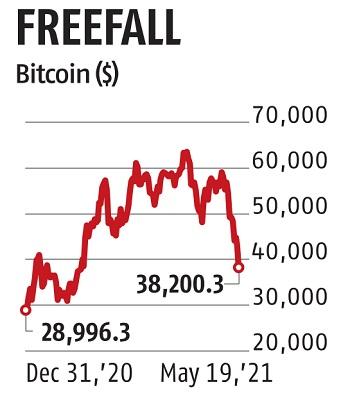The crypto bubble that inflated Bitcoin's value past $1 trillion and added billions to nonsense digital tokens overnight is bursting.
Bitcoin plunged almost 30 per cent to $31,000, wiping out more than $500 billion in value from the coin's peak market value, before recovering to $37,000 leavls. It erased all the gains it clocked up following Tesla Inc's February 8 announcement that it would use corporate cash to buy the asset and accept it as a form of payment for its vehicles. Ethereum, the second-biggest coin, sank more than 40 per cent, while joke token Dogecoin lost 45 per cent.
Bitcoin is now down more than 50 per cent from its record of almost $65,000 set in April. Fueling the volatility is Tesla CEO Elon Musk, whose social-media utterances have whipsawed the crypto community. A statement from the People's Bank of China on Tuesday reiterating that digital tokens can't be used as a form of payment added to the selloff.

Coinbase Global posted its biggest decline on record Wednesday, joining a rout in global crypto stocks after Bitcoin and Ether prices collapsed. The largest US cryptocurrency exchange fell as much as 13 per cent to a record low of $208. Coinbase also said it was investigating “intermittent downtime” on its platform, while Binance, the world's biggest cryptocurrency exchange, temporarily disabled Ethereum withdrawals.
“From a technical standpoint, the indicators are flashing red,” said Ipek Ozkardeskaya, senior analyst at Swissquote.
The Chinese crackdown
Chinese regulators have tightened restrictions that ban financial institutions and payment companies from providing services related to cryptocurrencies
The new measure
Three financial industry associations directed their members, which include banks and online payment firms, not to offer any crypto-related services, such as account openings and trading, reiterating the 2017 ban. But the new ban also covers more services. Institutions are prohibited from providing cryptocurrency saving, trust or pledging services.
Why stricter regulation
The global bitcoin bull run had revived cryptocurrency trading in China. Many Chinese investors were now trading on platforms owned by Chinese exchanges that had relocated overseas, including Huobi and OKEx.
The immediate impact
The fresh crackdown makes it more difficult for individuals to buy cryptocurrencies using various payment channels, and can hurt miners. Banks and payment firms also face challenges of identifying money flows related to cryptocurrencies.






